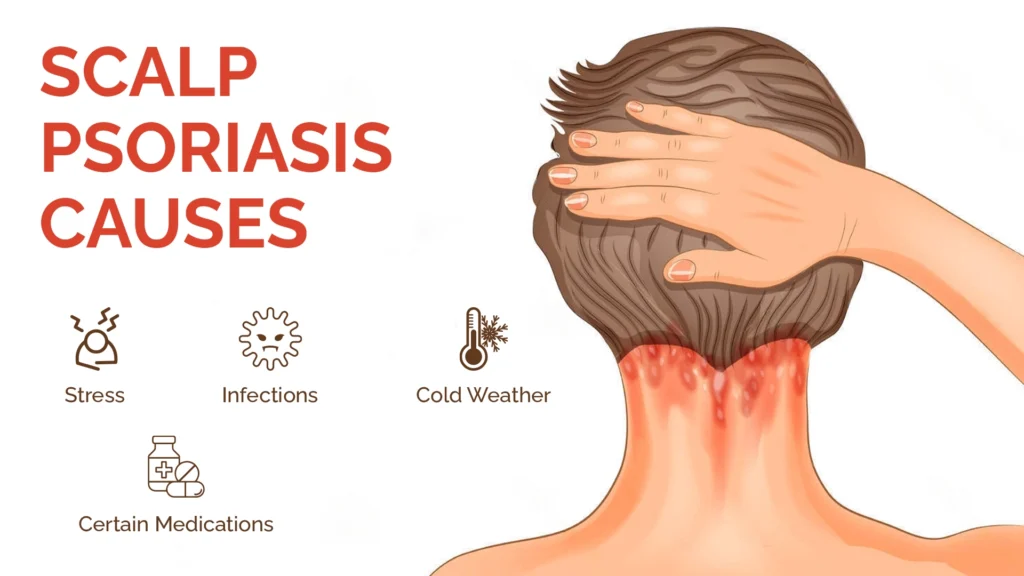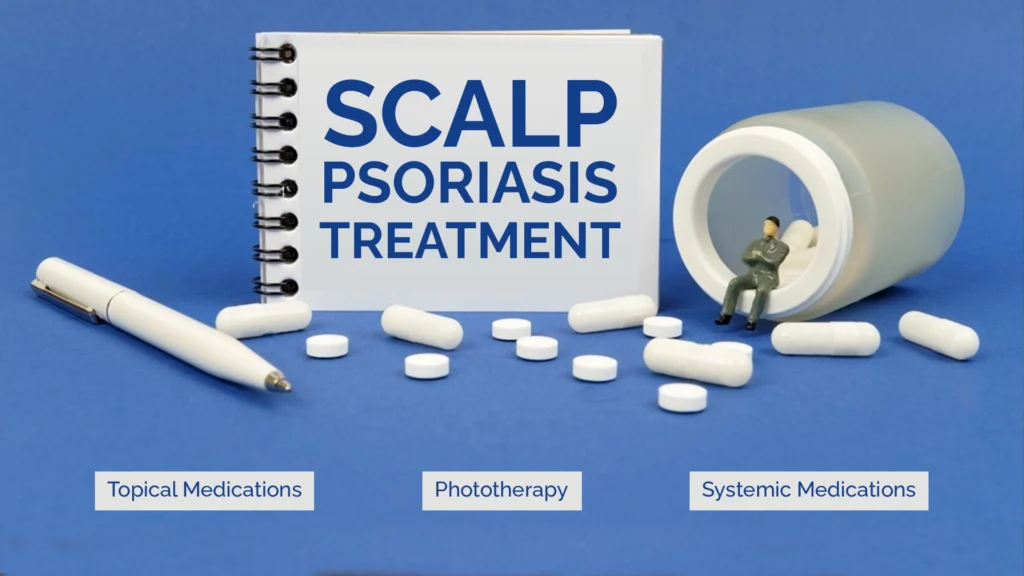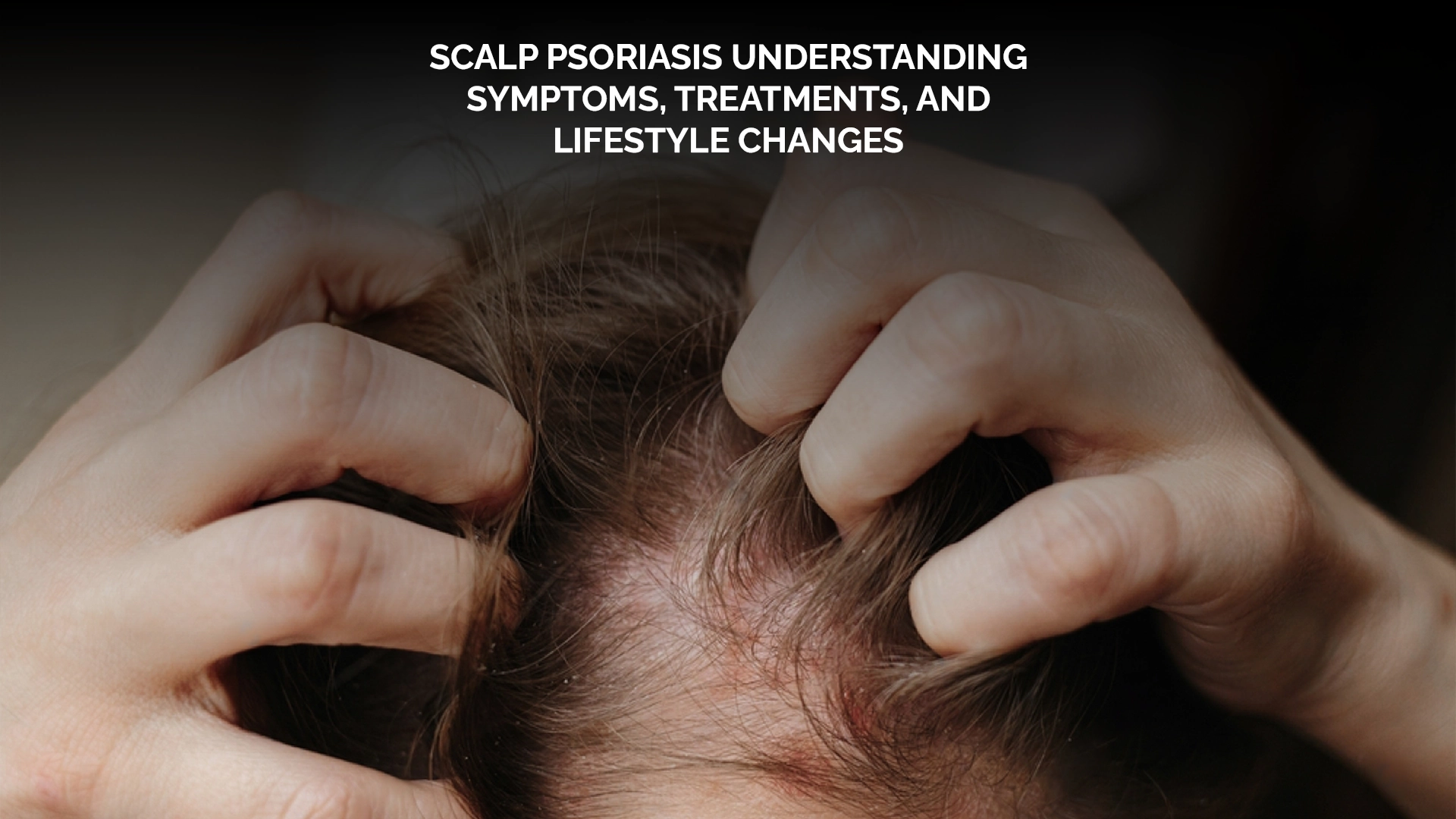Are you constantly scratching your head and noticing red, scaly patches on your scalp? If you answered yes, you are one of the millions of people who suffer from Scalp Psoriasis. Don’t panic because there is a solution for everything.
In this blog post, we’ll take a deep dive into scalp psoriasis, covering everything from scalp psoriasis causes and symptoms to diagnosis and treatment options. Therefore, You have to sit back and relax because we got your cover!
Let’s start the journey to healthier hair and scalp!
What Is Scalp Psoriasis?
It is a chronic autoimmune condition that affects the scalp, causing red, scaly patches and itching. According to research, approximately 50% of people with psoriasis. This is one of the conditions that causes the rapid buildup of skin cells.
Scalp Psoriasis Causes

The precise scalp psoriasis causes are not clear; however, it is considered to be a mix of hereditary and environmental factors. Some of the factors that might cause flare-ups are as follows:
- Stress,
- Infections,
- Cold weather,
- Certain medications.
Scalp Psoriasis Symptoms

Scalp Psoriasis Symptoms include
- Red patches on the scalp that may be itchy or painful
- Flaking or scaling of the skin
- Dryness or crusting of the scalp
- Soreness or burning sensation on the scalp
In severe cases, the patches may extend to the forehead, back of the neck, or behind the ears. The itching and flaking can be uncomfortable and embarrassing, making it challenging to go about your daily life.
How Is It Diagnosed?
You must be aware that an itchy scalp and flakes are more than simply Dandruff; they can be a significant problem. Hence, If you suspect you have this disease, you should seek medical assistance and have an accurate diagnosis. Your Dermatologist can usually conduct a checkup and analyze your symptoms. A skin biopsy could be conducted in some circumstances to confirm the diagnosis. If you are aware that you are suffering from Scalp Psoriasis Diagnose, then you can treat it. Perfectly.
Scalp Psoriasis Treatment

There are several treatment options available for scalp psoriasis, depending on the severity of your condition. Your Dermatologist will inform you in a better way about your situation. Here Easy Peasy Skincare mentions the Three Treatment options according to dermatologists.
Topical Medications
Your Dermatologist may recommend topical medications such as corticosteroids, vitamin D analogs, and retinoids. These medications work by reducing inflammation and slowing the growth of skin cells on the scalp.
Phototherapy
In more severe cases, phototherapy or systemic medications may be necessary. Phototherapy involves exposing the scalp to ultraviolet light, which can assist you in reducing inflammation and slowing the growth of skin cells.
Systemic Medications
Additionally, Your Dermatologist can recommend Systemic medications, such as methotrexate or cyclosporine, which work by suppressing the immune system and reducing inflammation.
Hence you must contact your Dermatologist to find the most effective Scalp Psoriasis Treatment plan for your individual needs. Your doctor may need to adjust your treatment over time as your symptoms change.
Managing Scalp Psoriasis Symptoms Through Diet And Hygiene
In addition to medical treatments, lifestyle changes can aid you in managing Scalp Psoriasis Symptoms.
For Example:
Avoiding triggers that are mentioned above as well, such as stress, cold weather, and specific medications, can be helpful. Practicing good scalp hygiene and maintaining a healthy diet can also make a difference.
A healthy diet can also aid in managing scalp psoriasis symptoms. Make an effort to include enough fruits, veggies, healthy grains, and lean protein in your diet. Additionally, Omega-3 fatty acids, which can be found in seafood, nuts, and seeds, may also help to reduce inflammation.
You can Know about the list of Fruits & Vegetables good for hair and skin by Clicking Here!
When it comes to scalp hygiene, it’s crucial to avoid harsh shampoos and styling products that can irritate the scalp. Instead, opt for gentle, fragrance-free products that are specifically designed for sensitive skin. You should also avoid scratching or picking at your scalp, as this can worsen symptoms and potentially lead to infection.
Potential Risks of Untreated Scalp Psoriasis
This is the point of getting serious about your hair’s healthy because there can be plenty of issues if you will not take its treatment. Untreated scalp psoriasis can lead to consequences such as hair loss, infections, and social isolation. After finding out about your diagnosis, get medical assistance right away if you want your hair to be healthy.
Final Thoughts
Scalp psoriasis is a chronic condition that can be challenging to deal with, but it’s essential to know that there are treatment options and lifestyle changes that can help manage symptoms.
Communicating with your doctor, practicing excellent scalp hygiene, eating a balanced diet, and seeking support from others can assist you in fighting this disease. Moreover, It is also important to practice self-care to aid in managing the emotional toll of living with this disease. This can involve engaging in things that you like, such as hobbies or exercise, as well as discovering healthy strategies to handle stress, such as meditation or deep breathing exercises. You can enhance your quality of life and deal with the difficulties that come with having scalp psoriasis. Remember that seeking immediate medical assistance and sticking to your treatment plan is critical to controlling symptoms and avoiding problems.

